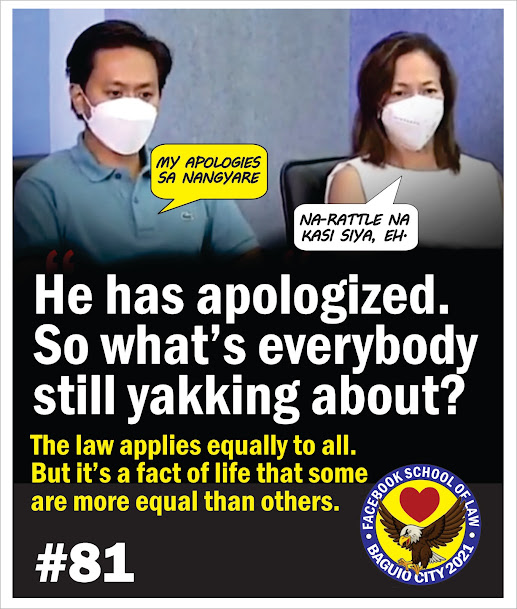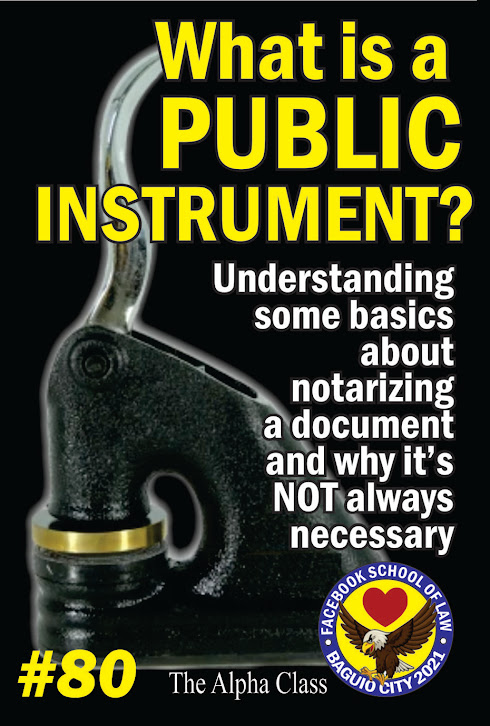I think one way to do that is to avoid calling the chatterboxes of Alpha Class: students like Deema, Kata, Jack, Juan, Hannah—even Jeffrox Laquiza Layao, evidently--these people can talk the wallpaper off the wall, if you let them.
So before I even stepped off the car in the parking lot, I made sure to isolate their classcards and put a rubber band to bind them together and placed them at the end of the deck.
So when I walked in the classroom, I was annoyed to see these very same people raising their hands ALREADY.
“I haven’t even asked a question yet, for crying out loud!” I said.
“Sir, we have a question!” they all chorused.
“We’re not discussing THAT, whatever it is,” I stood firm.
Of course, I caved in almost immediately, “What?? What is your question, Mister…uh…where’s Mister Denze Dean Pumayag?”
“Present, sir. Actually, I have no question…”
“Shut up!” I blocked the retreat right away. Of course he has a question and even if he didn’t, I know this class. In a matter of seconds, someone will have written the question on a small piece of paper and slipped it to the guy reciting to ask me, to throw me off my prepared lecture.
“I ask the questions,” I said, “and let me start with, are you another one of those people with a two-part first name also, Denze Dean?”
“I suppose so, sir. That is my compound first name—Denze Dean!”
“Hmm…we’ll you’re missing a letter ‘L’ somewhere,” I observed, “if that thing went all the way to ‘Denzel,’ you might have a shot at a date with Miss Deema there, or with one of the Ondafli twins, Miss Glad or Miss Gladys!” I teased the hunk-looking fellow who, I see from his classcard, is from Itogon, Benguet.
He also looked to me to have some kind of very diluted Japanese blood, perhaps.
“Denze is a Japanese name my half-Japanese mother gave me, sir.”
I knew it.
“Of course,” I said, “Itogon was one of the last stands of the Japanese Imperial Army in Northern Luzon during World War II. So I take it your father was some kind of ninja or samurai or Kawasaki or something?”
“Oh, no, sir! My father is Filipino-Chinese. His name is Justo Co, sir.” Mister hunk said.
“Well, if your father is surnamed Co, shouldn’t your surname also be Co?” I asked.
“Uhmm… my parents did not marry sir, because of the war. It was just too frantic at the time. But my father always wanted to marry my mother, it was my mother who kept saying ‘no, let’s wait for the right time’ I think because she just didn’t want to give up her maiden surname, sir.”
“I see. What’s your half-Japanese mother’s FIRST name?”
“Ayuko, sir.” For some reason, the class started giggling and Miss Deema started lightly stomping her feet again. Clearly, these bastards know something I don’t.
“Let me sort this out, Denze Dean,” I put things together slowly, “You bear your mother’s maiden surname because your father kept proposing marriage to her and your mother kept saying no?”
“Yes, sir. That’s right.”
“Your father introduced himself to your mother, knelt before your mother and said, ‘Hi, Justo Co…’ and your mother replied ‘Ayuko Pumayag??” the class exploded in boisterous laughter.
“The comedy writes itself, sir, hehehe,” Denze Dean said.
“I know,” I said, “and at the rate Miss Deema here stomps her feet at every funny situation in class, she’ll wear out those pink sneakers very quickly.”
“If you find my name too long, you can just refer to me as ‘Dean Pumayag’ sir,” Denze said.
“You CONSENT to me calling you ‘dehin pumayag?” the class burst out in more guffaws.
“No, I think I’ll just call you ‘Puma’ in class,” I said and it brought a huge, stupid grin to his face.
“I like it, sir! It’s only one syllable away from ‘pumasa!” the fellow said.
Jack butted in, “or one syllable away from ‘pumalpak.” More guffaws. Again, I had to bang the blackboard.
I was right. I wasted too much time and now Miss Kata (or it might have been Jeffrox) had already slipped a note to ‘Puma’ with a written question.
“Sir, we saw on TV the rich guy who ran over a security guard with his SUV in Mandaluyong has surrendered. And instead of putting him in handcuffs, the police even hosted a press conference for him. Why is that?” Puma surreptitiously read the note.
“Because he is rich.” I said.
The class fell silent.
“Oh, I’m sorry, class. Were you expecting a long answer?” I said sarcastically. So I said it again. Slowly this time:
“Beeeecooooos….heeeee….eeeees….reeeech!”
I could sense the deep anger welling in the hearts of my Alpha class. These are law students. They’ve been weaned on a rich diet fed them by all their professors teaching nothing but law and order, justice and equality, and good triumphing over evil.
Deema stood up, her eyebrows bouncing up and down, her right forefinger oscillating like one of those woodcarving penises that spring out when you pull off the barrel, “But what about the constitutional guarantee of equal protection of the law, sir??”
“What about it?” I said.
“Well, the Bill of Rights is very clear and emphatic about it, sir. no person shall be denied the equal protection of the law. The law must treat everybody equal, which means the police must treat this SUV driver accused of FRUSTRATED MURDER the same way they treat any other person accused of a serious crime!” Deema said.
“Well, if you must know, Miss Deema, the police is treating this accused a hundred times even MORE HARSHLY than another person also accused of serious crime. So I think we can afford to let this one slide by.”
“Never!” Miss Laarnee Iwasan suddenly interrupted, “the law must be the same for everybody, the treatment must be the same for every accused. Besides, WHEN sir? WHEN did the police treat somebody LIGHTER than they are treating this one now? Please tell us!”
“Okay,” I sat back in my chair, “do you remember on September 19, 2021 some guy named Julian Ongpin—let’s pretend we don’t know what relation to the former Trade Minister—was caught with 12 grams of shabu in a hotel in La Union, not far from here. So a case for illegal possession of shabu was filed against him. Then less than a month later, November 15, 2021, the charge was dismissed.” I said, as I leaned farther back on my swivel chair, stretched my legs and put up my feet on top of the table.
Jack Makataruz stood up, “It’s 12 grams of a banned substance alright, sir, but the Dangerous Drugs Act requires a minimum of 20 grams for it to be considered above personal consumption volume. It’s really tough to get a drug-trafficking conviction out of 12 grams.”
“Oh, did I forget to mention?” I said, “his girlfriend was also found dead in his hotel room.” The class went, “Oooooooh……!”
“The police said there were no signs of any physical struggle, no ligatures on the neck, no slit wrists, no loud screaming at night, no broken glasses, no torn drapes or blood-stained curtains or upturned furnitures, no suicide note—police said there was NOTHING to suggest that anything untoward happened in that room with just him and his girlfriend inside…well, if you don’t consider the presence of a dead body as ‘untoward’, of course.” I said, looking at my fingernails to suggest total boredom.
Cabo Buhan, my law student with a pre-Med undergrad, stood up next, “I guess the law is harsh but it is the law, sir. You said it yourself, the police found nothing in the crime scene—“
“They found a dead body,” I interrupted.
“Right, sir, which might have been just comatose and just died later during the autopsy,” his classmates burst out laughing once more, “in any case, sir, the prosecution has the burden of proving Julian Ongpin’s guilt beyond reasonable doubt, don’t they?”
I looked at him disbelievingly, “There are no words--” the class burst out in guffaws again.
“—to even begin to describe how ridiculous that sounds, Cabo.”
“Anyway,” I continued, “your classmate Cabo here is wrong. In this case, the prosecution did not have any burden to prove anything.---”
“What Rule is THAT, sir??!” Deema practically screamed.
“The Rule of Non-Necessary Acquittal,” I said. My students’ eyes all grew wide.
Aha! For the first time, Teacher’s Pet is stumped. Even she didn’t know the Rule, so she meekly said, “Can… can… can you please state that Rule again, sir?”
“My pleasure, Miss Deema,” I said as I sat up and looked the class straight in the eye, “The prosecution shall have absolutely no duty to prove any fact or allegation in a criminal case that was NEVER FILED.”
The Alpha Class fell silent.
“See, here, class. In the Ongpin case, there is certainly wrongful death. There is substance abuse, and there’s CCTV footage supporting circumstantial evidence. No murder case was filed. Not attempted, nor frustrated, not even homicide. Not even serious physical injuries, if you really want to stretch the sarcasm that far.”
“So here in this more recent SUV ‘traffic accident’ you don’t even have a dead body. If police were not minded to file a case in the La Union incident which had a dead body, what do you think they will do in this case with a couple of broken ribs?” I asked rhetorically.
“Equal protection demands that you exercise the same discretion—AND INDISCRETION—when dealing with two more or less similar situations. See, the police have IN BOTH CASES declined to identify the accused initially, they have given both accused time allowance to surrender voluntarily, they have issued a non-restrictive ‘lookout bulletin’ and said in BOTH CASES that this was not equivalent to a ‘Hold Departure Order,’ they have allowed lawyers to represent persons who are ‘at-large’ without even warning those lawyers that THAT is textbook ‘obstruction of justice,’ I could go on and on,” I said, "and that's for BOTH CASES. So what more equality can you possibly ask for??"
“Equal protection? I say that as far as the PNP is concerned, this is all par-for-course for them.”
“But when something looks suspicious on its face, shouldn’t government prosecutors step into the picture, sir?” Deema asked.
“That’s the OLD RULE,” I explained, “in the old days, a FISCAL doesn’t have to do much contemplation. He just takes ONE GLANCE at the situation, and if he thinks there is PRIMA FACIE--that means "on its face"-- showing of a crime, he can indict a suspect. What is the rule today, Miss Kata?”
“PROBABLE CAUSE, sir,” Kata said meekly, “it gives the prosecutor a great leeway to determine if there is reasonable grounds to engender a well-founded belief that a crime may have been committed, before the prosecutor can indict.”
“Count them, class: (1) reasonable grounds, (2) well-founded belief, (3) that a crime MAY have been committed--that’s THREE levels of discretion, versus one under the old rule. You give me that much allowance to GUESS, I’ll toss the coin everytime!” I said.
“But that is ABSURD, sir!” Deema said.
“Take it up with Congress, Miss Deema,” I said, “I’ll see you next week. Class dismissed.”*
(You can read the other lectures you missed in class here: “alphasectionclass.blogspot.com”)









